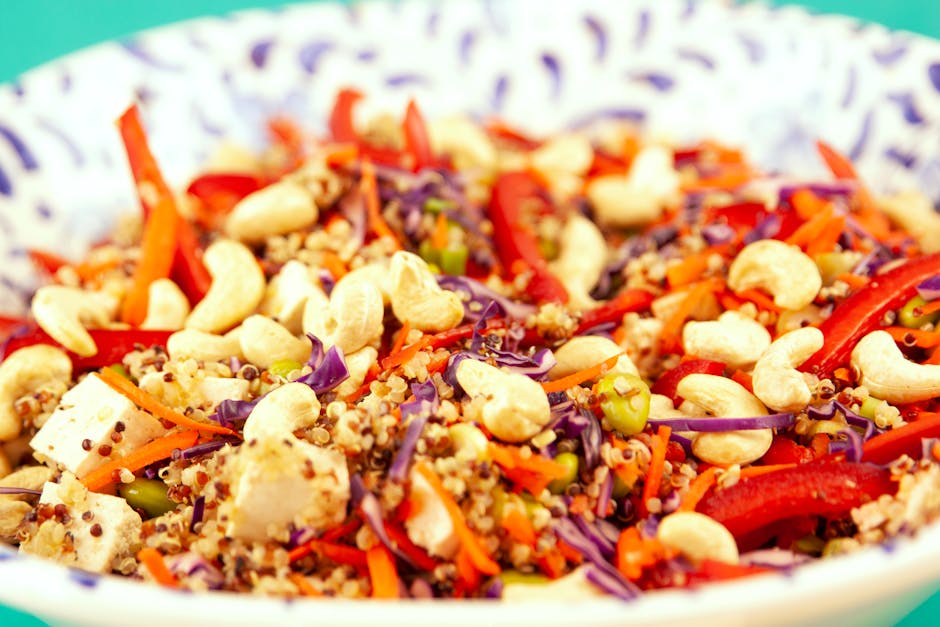The Vegan Revolution: Join the Movement and Transform Your Life With the Ultimate Guide to Plant-Based Living
Immerse yourself in the vegan revolution! Start your journey with the ultimate guide to plant-based living. Boost your health, immunity, and sustainability by embracing this vibrant lifestyle. Explore essential nutrients like iron-rich beans and protein-packed quinoa. Master meal planning with diverse, simple recipes. Delve into eco-friendly fashion and cruelty-free beauty. Advocate for compassion and environmental impact through education and community engagement. Uncover a world of possibilities as you begin this path to a brighter, healthier tomorrow. More secrets await you on this road of endless possibilities.
Key Takeaways
- Understand the benefits of plant-based living for health and the environment.
- Learn about essential nutrients for vegans like iron and protein sources.
- Get tips on vegan meal planning, grocery shopping, and recipe exploration.
- Discover vegan beauty and fashion tips for a cruelty-free lifestyle.
- Advocate for veganism through education, social media, and community engagement.
Benefits of Plant-Based Living

Explore the numerous benefits of plant-based living for a healthier and more sustainable lifestyle. By choosing a plant-based diet, you aren’t only taking care of your health but also positively impacting the environment. Let’s investigate the significant advantages of embracing plant-based living.
Firstly, let’s talk about the health benefits. Plant-based diets are rich in essential vitamins, minerals, and antioxidants that can boost your immune system, reduce the risk of chronic diseases like heart disease and diabetes, and even help in maintaining a healthy weight. By consuming a variety of fruits, vegetables, whole grains, nuts, and seeds, you provide your body with the nutrients it needs to thrive.
Secondly, consider the environmental impact. Plant-based diets have a lower carbon footprint compared to diets rich in animal products. The production of plant-based foods generally requires less water, land, and energy, making it a more sustainable choice for our planet. By choosing plant-based options, you’re contributing to the reduction of greenhouse gas emissions and helping to preserve natural resources for future generations.
Essential Nutrients for Vegans

To maintain a balanced vegan diet, it’s important to make sure you’re getting all the essential nutrients your body needs for peak health. Two key nutrients for vegans are iron and protein. Iron sources for vegans include beans, lentils, tofu, quinoa, and fortified cereals. Incorporating these into your meals helps guaranty you meet your iron needs without missing out on this crucial mineral.
When it comes to protein sources, don’t fret, as there are plenty of plant-based options to choose from. Foods like beans, lentils, chickpeas, quinoa, tofu, tempeh, nuts, and seeds are excellent sources of protein that can easily be included in your daily meals. By including a variety of these foods in your diet, you can meet your protein requirements and support your overall health and well-being.
Vegan Meal Planning Tips

Planning your vegan meals efficiently can help guaranty you meet your nutritional needs while enjoying a variety of delicious plant-based foods. When it comes to grocery shopping, make a list of essentials like fruits, vegetables, whole grains, legumes, nuts, and seeds. Having these staples on hand will make it easier to whip up quick and nutritious meals throughout the week. Don’t forget to cheque out your local farmer’s market for fresh, seasonal produce that can add excitement to your dishes.
For recipe ideas, explore different cuisines to keep your meals interesting and flavourful. Try making a hearty lentil stew, a colourful buddha bowl, or a creamy cocoanut curry. Websites and cookbooks dedicated to vegan cooking are great resources for discovering new dishes that you and your family will luv. Experiment with ingredients like nutritional yeast, tofu, and tempeh to add variety to your meals.
Meal planning doesn’t have to be overwhelming. Take some time each week to plan your meals, create a shopping list, and prep ingredients in advance. This will save you time during busy weekdays and help you stay on track with your plant-based lifestyle. Remember, the key to successful vegan meal planning is to keep it simple, diverse, and most importantly, enjoyable.
Vegan Beauty and Fashion Tips

Discover how incorporating vegan beauty and fashion practises can aline with your plant-based lifestyle effortlessly. When it comes to vegan beauty and fashion, there are plenty of options for you to stay true to your values while looking fabulous. Here are some tips to help you navigate the world of eco-friendly clothing and cruelty-free makeup:
-
Explore Eco-Friendly Clothing Brands: Look for clothing companies that prioritise sustainability and ethical practises. Brands using organic cotton, recycled materials, or upcycled fabrics are great choices for eco-conscious consumers.
-
Opt for Cruelty-Free Makeup: Choose makeup products that aren’t tested on animals. Many companies now offer a wide range of cruelty-free options, from foundations to lipsticks, allowing you to express your style without compromising your values.
-
Cheque Labels for Vegan Certification: To confirm that your beauty products are truly vegan, look for certifications from organisations like PETA or the Vegan Society. These labels guaranty that the products don’t contain any animal-derived ingredients.
-
Experiment with Second-Hand Fashion: Embrace thrift stores, vintage shops, and online marketplaces to find unique pieces that aline with your vegan lifestyle. Shopping second-hand isn’t only sustainable but also a fun way to express your personal style while reducing waste.
How to Advocate for Veganism

Advocating for veganism involves educating others about the benefits of a plant-based lifestyle and promoting compassion towards animals and the environment. Vegan activism is about spreading awareness and inspiring change. One effective way to advocate for veganism is through social media. Use platforms like Instagram, Facebook, and Twitter to share informative posts, delicious vegan recipes, and eye-opening documentaries. Social media allows you to reach a wide audience and engage in meaningful discussions about veganism.
Another impactful method of vegan outreach is through community engagement. Attend local events, host vegan potlucks, or organise informational sessions at community centres. By interacting with others face-to-face, you can address concerns, share personal stories, and showcase the positive aspects of vegan living. Community engagement helps build connexions and fosters a sense of camaraderie amongst like-minded individuals.
Frequently Asked Questions
Can a Vegan Diet Help Improve Mental Health and Cognitive Function?
A vegan diet can positively impact emotional well-being and cognitive performance. By focussing on nutrient-rich plant-based foods, you may experience improved mood stability and mental clarity.
The abundance of antioxidants and essential nutrients in fruits, vegetables, and whole grains can support brain function and overall mental health. Making the switch to a vegan lifestyle could potentially enhance your emotional resilience and cognitive abilities.
Are There Any Vegan Options for Building Muscle and Increasing Strength?
You might think vegans can’t build muscle, but surprise! Vegan protein options like tofu, tempeh, and lentils can help you bulk up and increase strength.
These plant-based powerhouses are packed with essential amino acids necessary for muscle building. Combine them with a well-rounded diet and a solid workout routine, and you’ll be amazed at the gains you can achieve without any animal products.
How Can Vegans Ensure They Are Getting Enough Iodine in Their Diet?
To make sure you’re getting enough iodine as a vegan, consider iodine supplements or including seaweed in your diet. Seaweed is a fantastic vegan iodine source that supports thyroid health. Including these options can help you maintain proper iodine levels and support your overall well-being.
Remember to consult with a healthcare provider to determine the right amount of iodine for your specific needs. Prioritise your health by including these sources in your plant-based diet.
What Are Some Plant-Based Sources of Omega-3 Fatty Acids for Vegans?
When it comes to getting your omega-3s from plant-based sources, think of flaxseed oil as the superhero of the bunch. Not only can you rely on flaxseed oil for your omega-3 supplements, but chia seeds, walnuts, and hemp seeds are also great options.
These power-packed plant foods will keep your vegan diet rich in those essential fatty acids your body craves. Embrace the goodness of these sources and sail through your omega-3 needs effortlessly!
Can a Vegan Diet Help With Reducing Inflammation in the Body?
A vegan diet can work wonders for reducing inflammation in your body. By focussing on plant-based foods rich in antioxidants and anti-inflammatory properties, you can give your gut health a boost.
These foods help combat inflammation, which is linked to various health issues. Incorporating plenty of fruits, vegetables, nuts, seeds, and whole grains into your diet can be a powerful way to support your body’s natural ability to fight inflammation and promote overall well-being.
Conclusion
Join the vegan revolution and tap into the power of plant-based living. Embrace a lifestyle that nourishes your body, mind, and soul.
Say goodby to outdated norms and hello to a world of compassion, health, and sustainability. Let your choices speak volumes, as you become a beacon of change in a world that needs it most.
It’s time to revolutionise your life and make a difference with every bite, step, and word you take. Join the movement, and together, we’ll change the world.
Contact us to discuss our services now!
